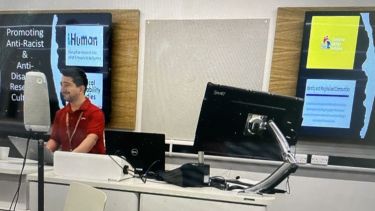“Promoting Anti-Racist & Anti-Disablist Research Cultures” Symposium.
On the 12th of July 2023, Antonios Ktenidis (Lead of the Identity and Marginalised Communities Research Cluster) and Alex Mason (Project Manager for the Centre for Equity and Inclusion) organised and hosted the ‘Promoting Anti-Racist & Anti-Disablist Research Cultures’ symposium. This symposium was part of the research project ‘Promoting Anti-Racist and Anti-Disablist Research Cultures’, funded by Research England.
The symposium brought together key scholars and academics to identify the key challenges and changes required to promote inclusive research cultures that are responsive to disability and race. Proposals for institutional policies and practices often do not give space to the intellectual contributions of black and disabled researchers and/or black, disabled researchers (see for example recent special issue of Nature). Moreover, there is often a disconnect between the innovative work of funders and non-government organisations and the aspirations of universities. Our symposium addressed these intellectual and sectoral gaps.
The symposium was run in a hybrid format, with presenters and attendees being in the room virtually and/or in person. This was an ethico-political choice, as access as an intersectional matter was at the core of the symposium. As discussed in the introduction, who was (and who was not) in the room (virtually or physically) was pertinent to issues of power.
The programme of the event was as follows:
Sana Rizvi
Toward Unruly Existence and the Politics of Excellence in University Research
Tasnim Hassan
Anti-racism and anti-ableism as praxis: Reflections on researching and engaging in spaces centred on disability and race.
Christina Lee
Research Ethics and the Ethics of Care for Marginalised Disabled Researchers in the “Post-Pandemic” Academy
Manel Lemmouchi and Ankita Mishra
International Postgraduate Researchers’ (PGR) experiences of research cultures
Antonios Ktenidis, Addy Adelaine, Tasnim Hassan, Jane-May Martin, Niger Fisher, Alex Mason
Co-creating an Accessibility Guide
Nathan Geering
The Anti-Racist & Anti-Disablist MANIFESTO
Our wonderful Head of Department, Prof Rebecca Lawthom, took notes of what was discussed throughout the symposium in the form of the ‘A-Z’ reflections:
A - Anti, access, ableism, absence, allyship, accountability, apology, adjustments, Ankita Mishra, Ahmed Sarah, accessibility guide, Alex Mason, Antonios Ktenidis
B - bell hooks, benchmarking, belonging, black and brown scholars, bed bound vs bed activism, bureaucracy, biopolitics, borders, barriers
C - Community, clapping, cultures, citizenship, Covid-19, conditionality, contextual funding, care, crip kinship, cash cows, collective, Christina Lee
D - Diversity, disabled people’s movement, defensive, disability, disablism
E - Elephant, excellence politics, evidence, emotional labour invoice, epistemology , exclusion, ethics of care, Ellie Lee, EDI
F - Fairness, FRAP, fragility
G - Grassroots, geopolitical north, geopolitics, grief
H - Hybrid, HEI, humanizing, hope, humility, healthy, hidden labour, hidden curriculum, historicity
I - Institutions, Intersectionality, impact of international students, invisible borders
J - Justice
K - Keep going!
L - Legitimacy, lack, lone wolf
M - Merit, the benchmark Man, microaggressions, multi species kinship, Manel Lemmouchi
N - Networks, narratives of deficit, Nathan Geering
O - Other(ing), options, opportunities, out of place
P - Power, praxis, presence, principles, ‘post pandemic’, peers
Q - Quality, questioning, queer
R - Remorse, racialising, reciprocity, relationality, retrofitting
S - Systemic, subjects, scholar activist, service, structural ableism, solidarity, slow down, Sana Rizvi
T - time, Tasnim Hassan
U - Unruly, uncouth
V - Vulnerability, ventilation
W - Whose, whiteness, wellbeing
X - xenophobia
Y - you were there (that is why we are here)
zzzz - time to rest after this productive day
A recording of the talks will become available in September.
As per the words of one of the attendees, one of the things the symposium achieved was “Having an open and comfortable space discuss sensitive topics. There are not many places/opportunities that allow this.”

